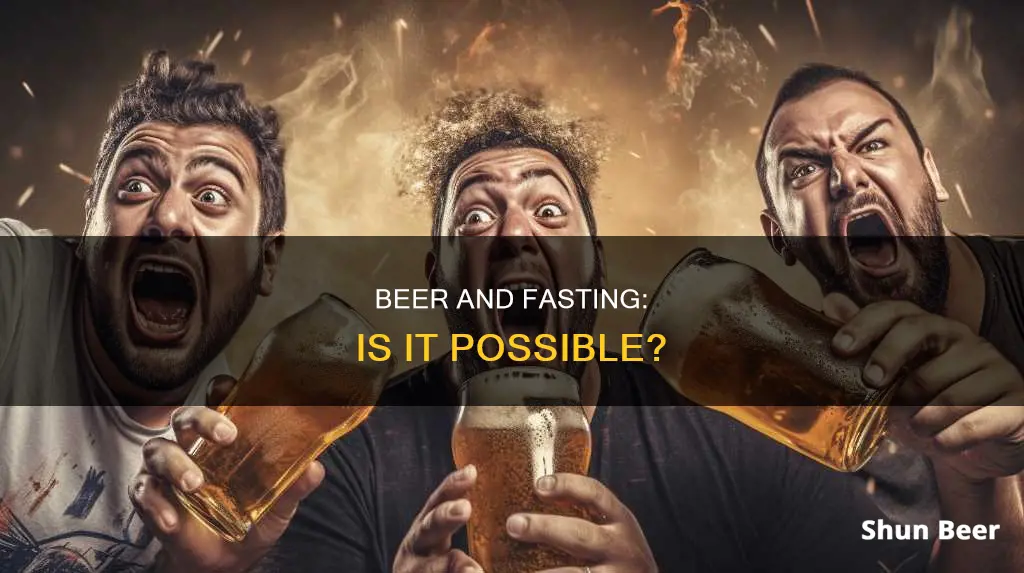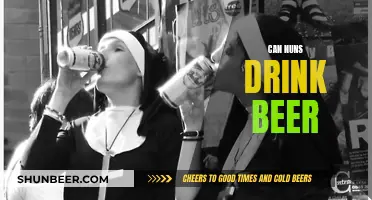
Intermittent fasting is a popular health trend that involves eating within a set time window and fasting for the remainder of the day. While water and other non-calorie beverages are typically consumed during the fasting period, some people wonder whether it is acceptable to drink alcohol during this time. The answer is yes and no. Alcohol is calorie-dense and will break a fast, but it can be consumed in moderation during the eating portion of the fast. It is important to note that drinking on an empty stomach is never a good idea, and alcohol may impede weight loss and stimulate overeating. As such, it is recommended to drink alcohol during the eating window and to prioritise low-calorie alcoholic drinks.
| Characteristics | Values |
|---|---|
| Can you drink alcohol while fasting? | Yes, but only during your eating window. |
| Best time to drink alcohol while fasting | After eating a meal, preferably with carbohydrates. |
| Recommended amount of alcohol while fasting | 1 drink for women and 2 drinks for men. |
| Alcohol's effect on fasting | Alcohol breaks a fast as it contains calories. Alcohol also inhibits fat loss and autophagy. |
| Alcohol's effect on weight gain | Alcohol is calorie-dense with 7 calories per gram. Moderate drinking may reduce the risk of weight gain, while excessive drinking may increase the risk. |
| Alcohol's effect on inflammation | Excessive alcohol intake may promote inflammation throughout the body, counteracting the anti-inflammatory effects of intermittent fasting. |
What You'll Learn

Drinking beer during a fast breaks your fast
Drinking beer during a fast will break your fast. While it is generally agreed that drinking alcohol during a fast will break your fast, some sources suggest that drinking alcohol in moderation during the eating portion of your fast is acceptable. However, it is important to note that alcohol contains calories and can trigger inflammation, increasing your risk of developing diseases.
Intermittent fasting is a popular health trend that involves alternating cycles of fasting and eating. It is often done to boost fat burning and decrease body fat percentage. There are several methods of intermittent fasting, including the 16:8 or 14:10 Method, the 5:2 Method, the Eat-Stop-Eat Method, Alternate-day fasting, and the Warrior Method.
The Effects of Alcohol on Intermittent Fasting
Alcohol can impede the benefits of intermittent fasting, especially if consumed during the fasting window. Alcohol is calorie-dense, with 7 calories per gram, and can stimulate appetite and lead to overeating. It can also prevent fat breakdown and oxidation, increase the risk of inflammation, and interfere with glucose metabolism. Additionally, drinking alcohol can lower your inhibitions, making it more challenging to stick to your fasting plan.
Recommendations for Drinking Alcohol While Intermittent Fasting
If you choose to drink alcohol while intermittent fasting, it is recommended to do so in moderation during your designated eating window. It is also suggested to drink at least three hours before bed, as alcohol can disrupt your sleep. Eating before drinking and choosing low-calorie alcoholic drinks can also help minimize the impact on your fasting state. However, it is important to prioritize your health and fasting goals and adjust your alcohol consumption accordingly.
Beer and Bowel Movements: The Laxative Effect
You may want to see also

Beer is calorie-dense
The reason alcohol has so many calories is that it is a highly concentrated solution. Hard liquors are 40% alcohol by volume, which means 40% of the beverage can be converted to energy—that's a lot of calories. To put this in perspective, consider drinking 40% milk fat. That's very fatty. Now, imagine if you were to substitute 6% of your liquid intake (which would usually be water, with zero calories) with 6% alcohol calories—you would gain weight.
The specific enzymes that break down ethanol are alcohol dehydrogenase, which turns ethanol into acetylaldehyde, and acetylaldehyde dehydrogenase, which then turns it into acetate. Acetate is a molecule that can be easily used by the body. It can be incorporated into Acetyl-CoA, which is a direct breakdown product of sugar metabolism, and this is what gives us energy—in other words, calories.
The reason alcohol has so many calories is because we drink a highly concentrated solution of it. Imagine drinking whole milk, which is about 4% fat. Although fat is a richer source of energy than alcohol, the 6% alcohol content in beer adds up.
In addition to alcohol, beer also contains residual carbohydrates that contribute to its calorie count. These carbohydrates give the beer body and mouthfeel. They can also be converted to fat, further increasing the calorie count.
Alcohol-free beer: A safe drink for liver disease patients?
You may want to see also

Beer may prevent fat burning
When you consume alcohol, your liver burns alcohol instead of fat. The body prioritises breaking down alcohol for energy before it gets to any stored fat waiting to be burned. This means that alcohol blocks fat breakdown and inhibits fat oxidation, resulting in higher body fat in the long term.
In addition, alcohol can increase your appetite and cravings for junk food, leading to weight gain over time. Observational studies have shown that excessive alcohol consumption is associated with increased levels of body fat.
To summarise, if you are looking to lose weight, it is best to skip the beer altogether. Beer contributes to weight gain and prevents fat burning due to its calorie content and the way it is processed by the body.
Beer Growlers: How Do They Work?
You may want to see also

Beer may stimulate overeating
Observational studies have shown that excessive alcohol consumption is associated with increased levels of body fat. However, this relationship does not appear in light to moderate drinkers. Alcohol may also stimulate overeating, which can lead to weight gain over time.
Consuming alcohol prior to a meal increases food consumption. This phenomenon is known as the "apéritif effect". The apéritif effect may result from increased activity in brain regions that mediate reward and regulate feeding behaviour.
While the mechanism underlying the apéritif effect is not yet fully understood, it is clear that alcohol intake can lead to overeating and subsequent weight gain.
Beer and Type 2 Diabetes: What's Safe?
You may want to see also

Beer is best drunk during your eating window
If you're incorporating fasting into your lifestyle, it's understandable that you may want to know how alcohol fits into your routine. The good news is that you can still enjoy a beer or two while intermittent fasting, as long as you follow a few guidelines.
Firstly, it's important to note that alcohol does break a fast. This is because alcohol contains calories, and to stay in a fasted state, you should avoid consuming anything besides water, black coffee, or herbal tea. However, this doesn't mean you need to give up alcohol entirely. Instead, it's best to consume alcoholic beverages during your designated eating window.
For example, if you're following a 16:8 intermittent fasting schedule, where you fast for 16 hours and eat within an 8-hour window, plan your beer consumption during this eating window. This way, you won't disrupt the fasting period.
It's also important to drink in moderation. According to the Dietary Guidelines for Americans, it's recommended that men have a maximum of two drinks, and women have a maximum of one drink. This moderate drinking level helps reduce the risk of alcohol-related harm. Additionally, it's a good idea to eat something before drinking alcohol, as drinking on an empty stomach can be dangerous and lead to faster absorption of alcohol.
When it comes to choosing a type of beer, opt for light or low-calorie options. These beers have fewer calories and can help you stay within your desired calorie intake for the day.
In summary, beer is best drunk during your eating window, and it's important to drink in moderation and be mindful of the type of beer you choose. This way, you can enjoy a beer while also reaping the benefits of intermittent fasting.
Get Rid of Your Beer Gut: Tips for a Trimmer You
You may want to see also
Frequently asked questions
Yes, you can drink beer while fasting, but only during your designated eating window. It is not recommended to drink on an empty stomach, as this can be dangerous.
Yes, drinking beer will break your fast, as it contains calories. However, it is still possible to drink beer in moderation during your eating window without breaking the effects of the fast.
Lower-calorie and lower-sugar alcoholic drinks are better choices while fasting. This includes light beer, dry wines like sauvignon blanc and pinot grigio, and distilled spirits such as vodka, tequila, rum, and whiskey.







